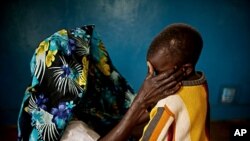Women from minority groups are often victims of rape and torture and are specifically targeted because of their ethnicity or religion. That’s according to a report published in Britain on Wednesday. Women are also the focus of a report published by the United Nations on Wednesday.
Mark Lattimer heads Minority Rights Group International. He said that minority women are the most vulnerable to physical violence.
"What has personally shocked me is that for women from minority groups, that discrimination takes the form of actual physical violence. In countries right around the world, minority women are being targeted for rape and other forms of violence simply on account of their ethnicity or their religion," said Lattimer.
Minority Rights Group made those women the focus of its annual report on Wednesday.
Lattimer says in conflict areas the problem is acute. The report highlights Iraq, where it says Christian and other minority women have been forced to wear head scarves to defend against violent attacks. In Somalia, it says Bantu and other minority women suffer rape and perpetrators attack with impunity.
Rape as a weapon
The report says rape is a weapon of war and minority women, because of their often low social-economic status, are most vulnerable.
Lattimer says minority women also suffer in peacetime. It’s key, he says, that their rights aren’t forgotten.
"We have come a long way in the last ten, twenty years in understanding the need to focus on defending the rights of women around the world," said Lattimer. "I think the scale of violations of women's rights has shocked many people. But I think those who are focused on women's rights need to understand that not all women are the same and that particular groups of women are much, much more vulnerable than others."
The report on minority women comes on the same day that the U.N.’s recently formed Women’s Agency published its first report.
Focus areas
Minority women are one focus of a broad campaign to put women at the forefront of the global agenda.
It looks at a range of issues in countries around the world, including violence, political and economic power, and legal protection. What rights, it asks, do women actually have.
John Hendra is Assistant Secretary-General of U.N. Women. He was in London for the report’s launch. "There is a lot of evidence that to really achieve the global development goals, the greatest multiplier effect is women's empowerment: ensuring equal access by women and girls to education, basic services, health and decision making," he said.
'Good news, bad news'
The report says across the board there is good news and bad news.
Politically, in some countries women are surging ahead. In Rwanda, for example, 51 percent of the parliament is female. But globally, only one-fifth of women are parliamentarians.
In 173 countries women are guaranteed paid maternity leave, but that’s not the case everywhere - not, for example, in the United States.
Rape in marriage is criminalized in 52 countries. But 2.6 billion women live in countries where it’s legal.
Hendra says the U.N. agency is designed to bring all this information under one roof so that governments and organizations can channel energy and resources where they’re most needed. "Our pockets are not deep but our role is much more trying to bring a much more synergistic approach to the U.N. system," he said.
According to the U.N. report, the gender pay gap was 20 percent in 2010. Hendra says giving women economic equality is key to women’s rights.
